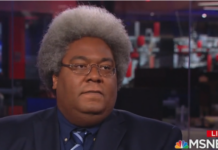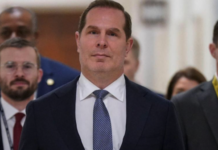Ah, the Associated Press—always the victim, never the instigator. This time, the “journalistic integrity” crowd is throwing a legal tantrum because President Trump dared to deny them the special access they think they’re entitled to. Their offense? Refusing to acknowledge Trump’s executive order renaming the Gulf of Mexico as the Gulf of America. Now, they’re in court, crying about a supposed First Amendment crisis, while a federal judge just told them: not so fast.
Let’s be clear—Trump didn’t shut down the AP, seize their offices, or slap a gag order on their reporting. They’re still free to publish whatever they want. But here’s the kicker: access to the Oval Office is not a constitutional right. Being part of the exclusive press pool that gets up close and personal with the president? That’s a privilege, not a guarantee. And yet, the AP is acting like they were banished to Siberia instead of just losing a front-row seat to Trump’s events.
Of course, their legal team is arguing that once the White House lets any press in, they can’t “arbitrarily” exclude anyone. That’s rich, considering how the mainstream media spent years cheering when the Biden administration sidelined conservative outlets like One America News or Breitbart. Back then, it was just “quality control.” Now that it’s happening to them, suddenly, it’s an existential threat to democracy.
The judge, to his credit, didn’t buy the AP’s sob story—at least not yet. He refused to grant them an immediate restraining order, pointing out that they were still covering events just fine using pool reports. In other words, their access being restricted isn’t exactly stopping them from doing their jobs. But, of course, the AP and its media allies are treating this like the end of the free press as we know it.
Let’s not pretend this is really about protecting journalism. It’s about power. The AP doesn’t just want access; they want to be the arbiter of truth, dictating what gets covered and how it’s framed. When they ignore Trump’s order on the Gulf of America, it’s not just some style guide decision—it’s a deliberate act of defiance, a message that they won’t recognize his authority even in the smallest of ways. So Trump responded in kind, making it clear that if they won’t play by the rules, they don’t get a seat at the table.
Predictably, the White House Correspondents’ Association is clutching its pearls, even though they’ve spent years enforcing their own brand of media gatekeeping. Under Biden, they were happy to play referee, deciding who was and wasn’t worthy of covering the president. But now that Trump is making the decisions, suddenly their “referee” role is being questioned. Funny how that works.
The AP’s argument boils down to this: We insulted you, defied you, and refused to recognize your orders—but you still owe us VIP treatment. Trump’s White House, unsurprisingly, is having none of it.
The winning continues at the Trump White House after a federal judge ruled in our favor against the activist @AP.
Asking the President of the United States questions in the Oval Office and aboard Air Force One is a privilege granted to journalists, not a legal right. pic.twitter.com/XJ3nDaJGoX
— Karoline Leavitt (@PressSec) February 25, 2025
The media’s real problem isn’t about “access” or the First Amendment. It’s that they’ve lost the exclusive control they once had over the narrative. And they’re desperate to get it back.







